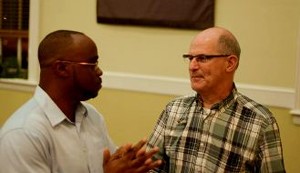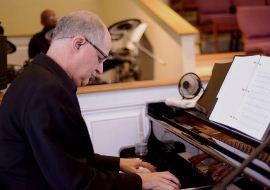 So the pastor of a church seeking to have diverse worship calls the musician in and says, "do you know any black gospel music?" The question is sincere, but the ramifications are boundless. To the musician,it means a complex series of experiences playing in black churches or learning the blues, funk, swing, or shuffles, and that she is not bound by the song books and hymnals in her resource library. To know black gospel means to be able to improvise on your instrument, to play outside your cultural space, and to feel the music in such a way that black worshipers will be welcomed and not irritated by some awkward rendition of a gratuitous performance of "Precious Lord" played like a rock ballad (i.e. "Oh Darlin'" by the Beatles). Or worse yet, played without any feeling at all for the inherent longing found in this gospel classic that has been performed many different ways.
So the pastor of a church seeking to have diverse worship calls the musician in and says, "do you know any black gospel music?" The question is sincere, but the ramifications are boundless. To the musician,it means a complex series of experiences playing in black churches or learning the blues, funk, swing, or shuffles, and that she is not bound by the song books and hymnals in her resource library. To know black gospel means to be able to improvise on your instrument, to play outside your cultural space, and to feel the music in such a way that black worshipers will be welcomed and not irritated by some awkward rendition of a gratuitous performance of "Precious Lord" played like a rock ballad (i.e. "Oh Darlin'" by the Beatles). Or worse yet, played without any feeling at all for the inherent longing found in this gospel classic that has been performed many different ways.
This scenario reminds me of NCF-Glenwood's hosting the national Latino conference for the PCA several years ago. We used several Spanish praise songs with our text projection. At one point, one of our Latino guests came back to the projectionist and asked, "May I put in the correct phonetic markings?" Even second language Spanish speakers tend to neglect those details, I was told later.
But black gospel music is a derivative of the blues together with the language, forms, and instrumentation of the American church. Some of its streams go back to slave days with call-and-response a cappella music, and others originated in night clubs of the 1930s when Thomas A. Dorsey played there as Ma Rainey's band leader in the Wild Cats Jazz Band. Just with those two cultural origins,we have already alienated many contemporary church musicians. Although there are many church musicians with a background in clubs, if they are white they have most likely played rock, classic rock,country rock, or mainstream pop music. Although that is a good start for contemporary worship, it still lacks the spirit or vibe of a blues musician or a musician who sits at the organ on a typical Sunday playing non-stop while the minister works the crowd and helps people deal with their emotions.
 Beyond the style of black gospel, there is also a repertoire. It is not enough to play in a blues style, but one needs to know the tunes of the historic revivalist Baptist churches, or the Church of God in Christ that did not believe in written music until the 1980s. COGIC music philosophy includes that "We will maintain the fire and exuberance of the former rain, while embracing the promise of the latter rain." COGIC artists include Fred Hammond, Kirk Franklin, Walter Hawkins, Andrae Crouch, and the presidentof its International Music Department, Dr. Judith Christie McAllister.
Beyond the style of black gospel, there is also a repertoire. It is not enough to play in a blues style, but one needs to know the tunes of the historic revivalist Baptist churches, or the Church of God in Christ that did not believe in written music until the 1980s. COGIC music philosophy includes that "We will maintain the fire and exuberance of the former rain, while embracing the promise of the latter rain." COGIC artists include Fred Hammond, Kirk Franklin, Walter Hawkins, Andrae Crouch, and the presidentof its International Music Department, Dr. Judith Christie McAllister.
Other renowned musicians from black gospel history and sources include Mahalia Jackson, James Cleveland, Sam Cooke and the Soul Stirrers, and Shirley Caesar.
Add to this catalog all the favorite songs from 60 years of church music throughout the struggle of African Americans for civil rights and for political significance seated in the local church, and you have an inkling of what your pastor is asking (though he probably doesn't know it) when he says, "could you play black gospel?"